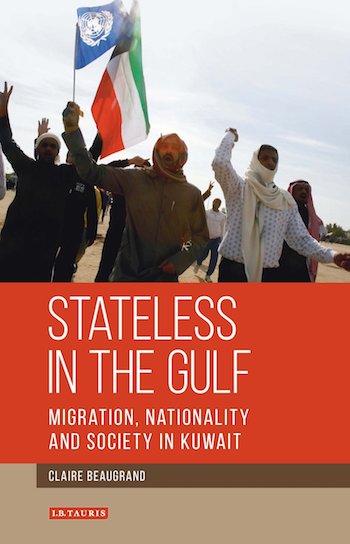by Bronwen Manby
 Among scholars and activists working on the phenomenon of statelessness, the Bidoon of Kuwait and the Gulf States more generally are simultaneously one of the best- and least-known cases. Best-known, because the Bidoon (“without”, short for bidoon jinsiyya, or “without nationality”), are among the longest-standing populations of stateless persons; least-known, because it has been challenging to acquire detailed information about their circumstances and the numbers affected, and to understand the real blockages to resolution of their status.
Among scholars and activists working on the phenomenon of statelessness, the Bidoon of Kuwait and the Gulf States more generally are simultaneously one of the best- and least-known cases. Best-known, because the Bidoon (“without”, short for bidoon jinsiyya, or “without nationality”), are among the longest-standing populations of stateless persons; least-known, because it has been challenging to acquire detailed information about their circumstances and the numbers affected, and to understand the real blockages to resolution of their status.
The Bidoon are also exemplars of many of the broader causes of statelessness: a population left behind when nationality is determined and documented after state succession (in this case, transfer of sovereignty between Britain and a newly independent Kuwait); a law which provides for nationality to be acquired at birth only on the basis of descent, and only through the father; and a minority group facing suspicion on grounds of ethnic and religious affiliation. Though Kuwait’s democratic institutions have only limited power, the Bidoon are also numerous enough to be perceived as threat to the existing political balance of power if fully integrated as nationals of the state; while the extension of recognition might also risk dilution of generous welfare benefits to nationals.
Kuwait, in line with the other Gulf States, recognised British authority by treaty in 1899 as a way of resisting incorporation into the Ottoman Empire, becoming a British “protected state” notionally in control of its internal affairs. The sheikhdom adopted its first nationality law in 1948, the same year as the first major legislation on British nationality, and replaced it in 1959, in anticipation of regaining independence in 1961. The 1959 law, amended several times, remains the law in force. Roughly one third of the 3.4 million residents today are Kuwaiti nationals; and of the remainder somewhere in the region of one or two hundred thousand are Bidoon (the numbers are highly contested), without recognised nationality of Kuwait or any other country. Kuwait insists, as is usual in such situations, that the Bidoon are not stateless, but in fact nationals of other (mainly neighbouring) states.
The 1959 law recognises as nationals those subjects of the sheikh who can trace their ancestry in the country through the paternal line back to 1920 (the 1948 law required 1899); some others could naturalise. Those residents who were left out during an initial population registration exercise following independence have struggled to obtain recognition of nationality till today. In 1986 this group were declared “illegal residents”, a status most continue to hold, despite various initiatives undertaken to provide access to Kuwaiti nationality for some limited numbers, notably through a law on “gradual naturalisation” adopted in 2000.
 Bronwen Manby is a Research Fellow at the LSE Middle East Centre and a leading authority on nationality law and statelessness in Africa. She has written on a wide range of human rights issues in Africa, with particular interests in South Africa and Nigeria (especially the oil industry in the Niger Delta), and in continental developments in human rights law. At the Centre she is Principal Investigator on the research project ‘Preventing Statelessness among Migrants in North Africa and their Children: Role of Host and Sending States in Providing Birth Registration and Identity Documents‘.
Bronwen Manby is a Research Fellow at the LSE Middle East Centre and a leading authority on nationality law and statelessness in Africa. She has written on a wide range of human rights issues in Africa, with particular interests in South Africa and Nigeria (especially the oil industry in the Niger Delta), and in continental developments in human rights law. At the Centre she is Principal Investigator on the research project ‘Preventing Statelessness among Migrants in North Africa and their Children: Role of Host and Sending States in Providing Birth Registration and Identity Documents‘.







1 Comments